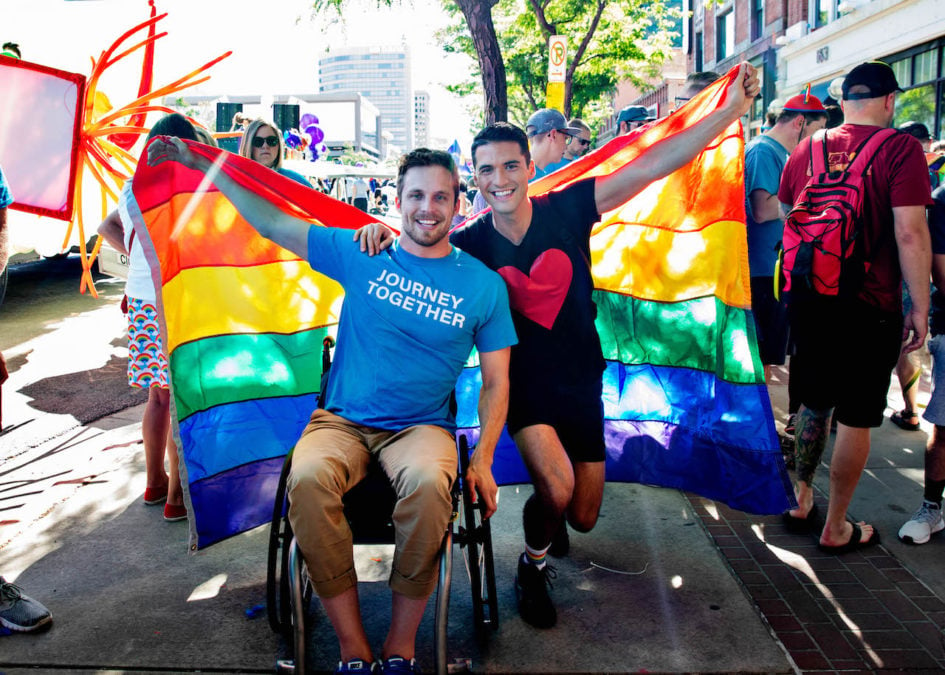The documentary “State of Pride” looks at what Pride means to young people 50 years after the Stonewall Riots.
‘State of Pride’ documentary
The movie stars social media influencer Raymond Braun, who travels to three different communities – Salt Lake City; San Francisco; and Tuscaloosa, Alabama – and their Pride celebrations. At the locations, Braun asks a younger generation about Pride and the relevancy it has in their lives. Some people are excited, while other members of the community lament the lack of compassion or togetherness they feel at the annual events.
“State of Pride” streams on YouTube Originals.
Braun previously worked at YouTube before launching his own channel focusing on LGBTQ visibility and equality.
YouTube criticism
YouTube has been heavily criticized for allowing racist and anti-LGBTQ videos and comments on its site. Earlier this week, YouTube CEO Susan Wojcicki apologized to the LGBTQ community and admitted some of the comments have been “very hurtful,” but refused to remove them.
Transgender activists Marsha P. Johnson, Sylvia Rivera to be honored in monument
“State of Pride” is directed by Academy Award winning filmmakers Rob Epstein and Jeffrey Friedman, whose groundbreaking work (“The Times of Harvey Milk,” “Common Threads: Stories from the Quilt,”“The Celluloid Closet,” and “Paragraph 175”) chronicles the LGBTQ experience. “The Times of Harvey Milk” and “Common Threads” won the Oscar for Best Documentary in 1985 and 1990.
During an interview with Q Voice News, Braun talks about visiting Tuscaloosa, Alabama; creating thousands of LGBTQ Prides across the United States; and welcoming transgender women of color to Pride events.
Here are some excerpts.
Visiting Tuscaloosa, Alabama
“Growing up, I always wanted to visit all 50 states,” Braun says. “I’m from a small, conservative town inNorthwest Ohio that had a population of 1,000. I’m glad I went to Tuscaloosa.
“Their story left a big impact on me and the meaning of pride. Until they met us, the some of the people at Tuscaloosa Pride had very few opportunities to meet other gay people.”
More cities need Gay Pride events
“There’s this narrative that when you’re gay and grow up in a small town, you can move to a big city where you will be accepted,” Braun says. “I hope that we can create cities across the U.S., not just big cities, that embrace people.
“The idea of Pride is to create Pride in every community and let people be who they are,” Braun says. “The way that a community responds to the idea of Pride tells you a lot about their values.”

Raymond Braun, right, poses for a photo with an attendee at the Salt Lake City Pride Parade and Festival in Utah on June 3, 2018. Photo by Kim Raff.
Tuscaloosa Pride
“About 200 people attended. Some were from Tuscaloosa. Two people featured in the documentary drove two hours to attend Tuscaloosa Pride,” Braun says.
“It’s in the town square. It’s the same weekend as homecoming at the University of Alabama. It’s an interesting juxtaposition of sports and Pride,” Braun says. “People have picnics. There are vendor booths and musicians. It’s more of a community gathering.”
LGBTQ Pride in rural areas
“Going to Tuscaloosa, I had never been to a Pride that size,” Braun says. “Most of the Prides I have attended have been in larger and medium sized cities. For the documentary, we wanted to experience rural Prides and see what kind of community it would foster.”
Black, Latino transgender women told Braun they don’t feel welcome at Pride events
“I was sad and upset to hear them reflect on not feeling welcome, but I wasn’t surprised. I’ve heard it previously,” Braun says. “It’s important for everyone in our community to make everyone feel welcome.
“Transgender women have been on the frontlines of the gay rights movement. We need to know our history.”
Welcoming transgender women of color
“One of the most important things to remember about Pride is, What does community mean to you?,” Braun says. “It’s important to make friendships, have conversations, and make connections with other people and find out how to support each other. Exposure yourself to a broad range of people.”
“People connect with stories and storytelling. Those different experiences can open our empathy,” Braun says. “The more we share our stories, the more our empathy will grow naturally.”
